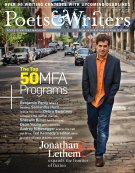On September 25, nearly two years after pulling up stakes in New York City's SoHo neighborhood, Poets House opened the doors to its new location in lower Manhattan, kicking off a long-awaited inaugural season of readings, workshops, exhibitions, and outreach programs. The library and literary nonprofit, founded in 1985 by Elizabeth Kray and the late two-time U.S. poet laureate Stanley Kunitz, has taken up residence in the first two stories of 10 River Terrace in Battery Park City—a space it will occupy rent free until 2069.
The collection, which comprises more than a thousand audiovisual recordings, is one of the most comprehensive public poetry resources in North America.
Executive director Lee Briccetti explains that the decision to leave the former location, a loft on Spring Street where Poets House had been based since 1990, was prompted by the city's perennially rising rents. "We do great work," she says. "But we're also a place. And when you're a place in New York City, you bump up against the issue of real estate." Poets House found a long-term solution to the dilemma in October 2007 when it scored a six-decade lease, gratis, from the Battery Park City Authority, the public-benefit corporation that oversees the planned community. But the organization still had to wait for the keys to its new home. "The developer had to finish his work before we could begin," Briccetti says of the complex bureaucratic ballet that delayed the move for over two years. "But once we got access to our space, we were on time. The poets were on time!"
The result of the process—aided by a fund-raising campaign that, by last summer, had generated ten million dollars—is a bright, airy, eleven-thousand-square-foot space overlooking Nelson A. Rockefeller Park and the Hudson River. Situated between the Mercy Corps Action Center to End World Hunger and a soon-to-be-opened branch of the New York Public Library, the building abuts shady Teardrop Park—now modified to incorporate stadium seating for outdoor poetry events. Inside, Poets House kept the presentation room intimate while making sure it was tricked out with enough recording and digital broadcasting technology to give the programming global reach.
Designed by architect Louise Braverman (lately feted for her work on the Derfner Judaica Museum in the Bronx), the new space is certified green according to LEED Gold standards—a condition of tenancy at the location—and includes photosensitive lighting, adjustable-flow toilets, and insulation made from recycled blue jeans. Construction materials were sourced within a five-hundred-mile radius whenever possible, with the wooden floors coming from Pennsylvania.
With its UV-blocking windows and mold-resistant drywall, the new Poets House ensures that the nonprofit's fifty-thousand-volume library will remain safe from the elements. The collection, which also comprises more than a thousand audiovisual recordings, is one of the most comprehensive public poetry resources in North America.
In keeping with its new green home, Poets House will run a series of events this season exploring the intersection of poetry and ecology. This fall's programming included seminars with John Felstiner, author of Can Poetry Save the Earth? (Yale University Press, 2009), and next spring, the organization will launch a three-year project to place poets-in-residence at zoos around the country. Even bits of the collection at Poets House are venturing outdoors: Thanks to a collaboration with New York Waterway, poetry-emblazoned ferryboats already ply the Hudson, and the nonprofit has plans to project verse onto the sidewalk surrounding its building. "Every time people come to the space we want it to be slightly different and whimsical," Briccetti says, "a place of serious study but also a place of fun and inspiration and surprise."
In previous years, Poets House has served about twenty thousand visitors annually, in addition to the two million or so who access its materials online. Its new location, situated as it is near one of the world's great pilgrimage sites—Ground Zero—is expected to at least triple its traffic. And Poets House is already looking to the possibilities for growth ahead. "We love the bricks and mortar," says Briccetti. "We think they're beautiful. But this is only the baseline. What really counts is what we build next."
Adrian Versteegh is editorial director of Anamesa. He lives in New York City.








